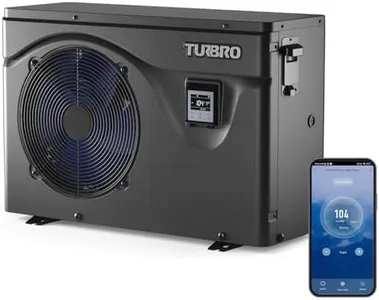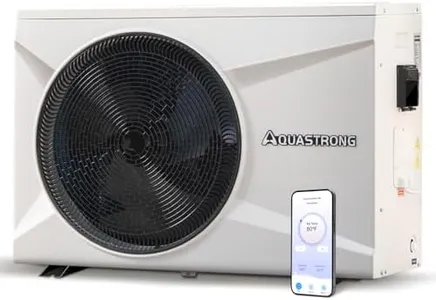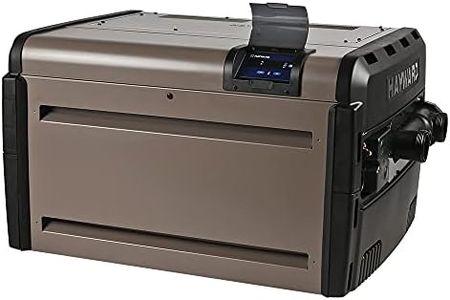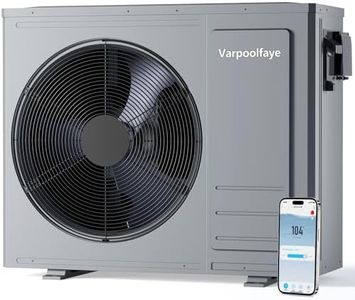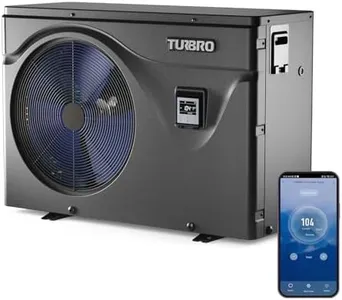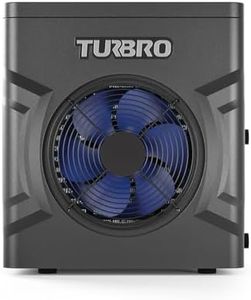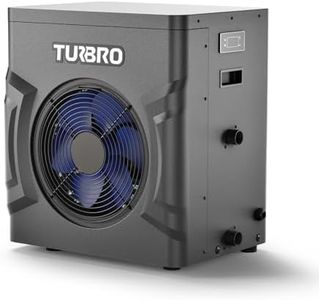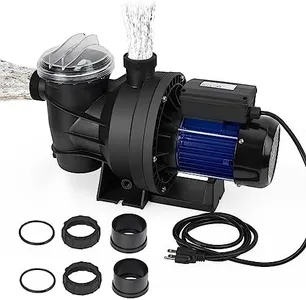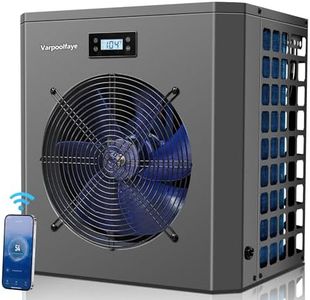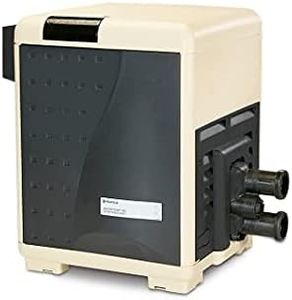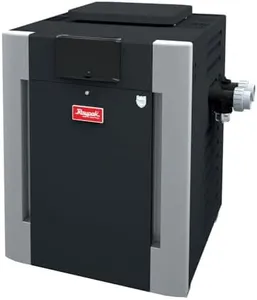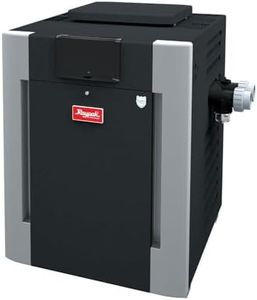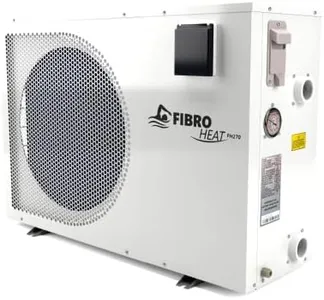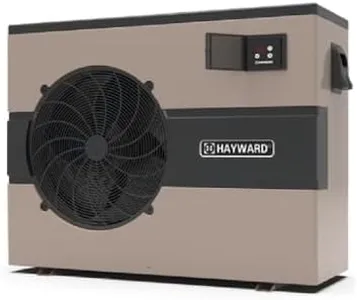10 Best Pool Heaters 2025 in the United States
Our technology thoroughly searches through the online shopping world, reviewing hundreds of sites. We then process and analyze this information, updating in real-time to bring you the latest top-rated products. This way, you always get the best and most current options available.

Our Top Picks
Winner
Aquastrong 75,000 BTU Inverter Swimming Pool Heat Pump, 21,000 Gallons Electric Pool Heater for Above Ground and Inground Pool, WiFi Capable Timer, Heating and Cooling Pool Heater 220V
Most important from
14 reviews
The Aquastrong 75,000 BTU Inverter Swimming Pool Heat Pump is a robust option for both above-ground and inground pools, accommodating up to 21,000 gallons. Its dual-mode function for heating and cooling makes it versatile for year-round use, providing comfortable water temperatures even in cooler climates. One of its notable advantages is the rapid heating capability, delivering warmth quickly, which is particularly beneficial for large pools or regions with chilly weather.
The unit's energy efficiency is impressive, boasting a 15.8 COP and promising up to 70% energy savings compared to traditional electric heaters, thanks to its full DC variable frequency technology. This makes it a cost-effective solution over time, despite potential higher initial costs. Noise levels are kept low at 53 dB due to the variable frequency technology, ensuring a quieter operation. Additionally, the automatic defrost system enhances performance during cold weather, maintaining continuous operation.
Installation is user-friendly with multiple connection options, and the provided 3-year warranty offers peace of mind. However, at 218 pounds, the unit is quite heavy, which might pose a challenge during installation. It also requires a 220V power source, which should be considered if your pool area isn't already equipped for this. The WiFi-capable timer for remote control adds convenience but may require some tech-savviness to fully utilize. The initial cost might be higher compared to simpler models, but the long-term energy savings and robust performance could justify the investment. This unit is best suited for those looking for an efficient, high-capacity pool heater with advanced features for year-round use.
Most important from
14 reviews
Hayward W3H400FDN Universal H-Series 400,000 BTU Natural Gas Pool and Spa Heater for In-Ground Pools and Spas
Most important from
518 reviews
The Hayward W3H400FDN Universal H-Series 400,000 BTU Natural Gas Pool and Spa Heater is a robust option for heating in-ground pools and spas. With a significant heating capacity of 400,000 BTU, it is well-suited for larger pools and spas, providing efficient and fast heating. The heater features a durable cupro-nickel heat exchanger that offers excellent protection against corrosion, which is essential for maintaining longevity and reliability, especially in areas with unbalanced water chemistry.
Its industry-leading hydraulic design is notable for reducing the circulation pump run time, leading to major energy savings and improved efficiency. Additionally, low NOx emissions ensure it meets air quality standards, making it an environmentally friendly choice. The heater's front-panel-only access and intuitive control pad design simplify operation, servicing, and maintenance, which is a plus for ease of use.
It is essential to consider that natural gas heaters can have higher operational costs due to fuel expenses compared to electric or solar options. The initial installation may also require professional help, adding to the cost. Weighing 195 pounds and measuring 39.6 x 32.8 x 30.6 inches, it requires adequate space and planning for installation. This heater is ideal for users needing a powerful, efficient, and reliable solution for heating large pools and spas, with the trade-off being higher operational costs and potentially higher initial setup complexity.
Most important from
518 reviews
Aquastrong 35,000 BTU Inverter Swimming Pool Heat Pump, 9,000 Gallons Electric Pool Heater for Above Ground and Inground Pool, WiFi Capable Timer, Heating and Cooling Pool Heater 120V
Most important from
14 reviews
The Aquastrong 35,000 BTU Inverter Swimming Pool Heat Pump is a versatile option for both above-ground and inground pools, capable of handling pools up to 9,000 gallons. With its dual-mode functionality, it heats and cools water, making it suitable for year-round use, especially in climates where the temperature can vary. This feature is particularly beneficial for users looking to extend their swimming season into cooler months.
Its energy efficiency is notable with a COP of 15.8, which means it can deliver a lot of heat for the energy it consumes. This is achieved through the inverter technology, which adjusts power usage dynamically, resulting in significant energy savings compared to traditional electric and gas heaters. The noise level is kept low at 48 dB, which is quite impressive for a pool heat pump, ensuring a quiet poolside environment.
One of the standout features is its smart connectivity, allowing users to control the pump via an app. This provides convenience in adjusting settings remotely, monitoring energy consumption, and setting schedules, which can be a substantial advantage for busy users.
However, the installation might require some effort despite the easy assembly claim, especially if you're not familiar with pool systems. It's relatively heavy at 116.8 pounds, which might require additional hands or professional installation. The unit also operates on 115 volts, so it's essential to ensure compatibility with your power supply.
In terms of cost, while the initial investment could be higher, the energy savings over time and the unit's durability may balance that out. The 3-year warranty offers some reassurance in terms of reliability. This heat pump is likely best suited for those looking to efficiently manage pool temperature throughout varying seasons while being conscious of energy use.
Most important from
14 reviews
Buying Guide for the Best Pool Heaters
Choosing the right pool heater can significantly enhance your swimming experience by extending the swimming season and ensuring comfortable water temperatures. When selecting a pool heater, it's important to consider various factors such as the size of your pool, your climate, and your heating preferences. Understanding the key specifications will help you make an informed decision that best suits your needs.FAQ
Most Popular Categories Right Now
